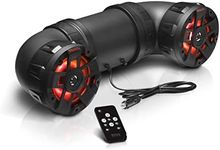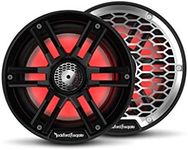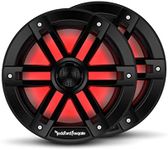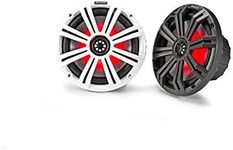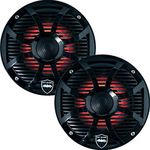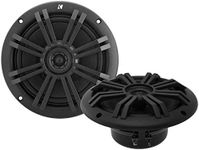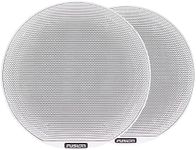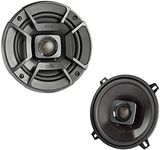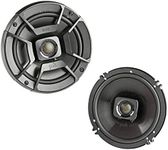Buying Guide for the Best Marine Speakers
Choosing the right marine speakers is important for anyone who wants to enjoy music or audio while out on the water. Marine speakers are specially designed to withstand harsh conditions like water, salt, and sun exposure, which regular speakers can't handle. When shopping for marine speakers, it's important to focus on features that ensure durability, sound quality, and compatibility with your boat's setup. Understanding the key specifications will help you find speakers that not only last but also deliver the listening experience you want.Waterproof and Weather ResistanceThis specification tells you how well the speakers can handle exposure to water, humidity, and salt. It's crucial because marine environments are tough, and regular speakers would quickly get damaged. Look for terms like 'waterproof,' 'water-resistant,' or 'marine-rated.' Some speakers are fully waterproof and can handle being splashed or even submerged, while others are just resistant to light moisture. If your speakers will be exposed directly to water or rain, choose fully waterproof models. If they'll be installed in a sheltered area, water-resistant may be enough.
Power Handling (Wattage)Power handling, measured in watts, indicates how much power the speakers can handle from your audio system without getting damaged. This affects how loud and clear your music will sound. Speakers with higher wattage can play louder and handle more powerful amplifiers. If you like your music loud or have a powerful stereo system, look for speakers with higher power handling. For casual listening at moderate volumes, lower wattage speakers will suffice.
Speaker SizeSpeaker size, usually measured in inches, refers to the diameter of the speaker cone. Larger speakers generally produce deeper bass and fuller sound, while smaller ones are easier to fit in tight spaces. Common sizes are 6.5 inches, 8 inches, and sometimes smaller or larger. Choose a size that fits your boat's available mounting locations and matches your sound preferences. If you want strong bass and have space, go bigger; if space is limited, smaller speakers are more practical.
Material QualityThe materials used in marine speakers affect both their durability and sound quality. Look for cones made from polypropylene or similar plastics, surrounds made from rubber, and corrosion-resistant hardware. These materials resist water, UV rays, and salt, which helps the speakers last longer. If your boat is often exposed to sun and saltwater, prioritize speakers with high-quality, marine-grade materials.
Mounting StyleMarine speakers come in different mounting styles, such as flush-mount (built into a surface) or box/tower mount (enclosed in a box or pod). The right style depends on your boat's layout and where you want to place the speakers. Flush-mount speakers are more discreet and save space, while box or tower speakers can be aimed for better sound direction. Consider where you want your sound to come from and how much space you have when choosing a mounting style.
ImpedanceImpedance, measured in ohms, is a technical detail that affects how the speakers work with your amplifier or stereo. Most marine speakers are 4 ohms, which matches most marine audio systems. Matching impedance ensures your speakers get the right amount of power and perform well. If you're replacing existing speakers, check your system's specs and choose speakers with the same impedance for best results.
UV ProtectionUV protection means the speakers are designed to resist damage from sunlight, which can cause fading, cracking, or weakening of materials over time. This is important if your speakers will be exposed to direct sunlight for long periods. If your boat is often out in the sun, look for speakers with UV-resistant grilles and housings to ensure they stay looking and sounding good.
